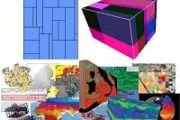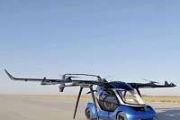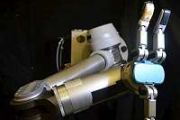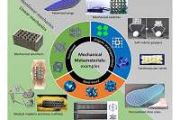
Copernical Team
Martian dust may endanger astronaut health during surface missions
 New research involving the University of Colorado Boulder warns that exposure to Martian dust could pose serious health threats to astronauts on future missions. According to the study, prolonged contact with this extraterrestrial dust may result in chronic lung damage, disruptions to thyroid function, and other harmful conditions.
Published in the journal GeoHealth, the study is the first
New research involving the University of Colorado Boulder warns that exposure to Martian dust could pose serious health threats to astronauts on future missions. According to the study, prolonged contact with this extraterrestrial dust may result in chronic lung damage, disruptions to thyroid function, and other harmful conditions.
Published in the journal GeoHealth, the study is the first ExoMars rover to land on Mars aboard European-built platform
 The European Space Agency (ESA) has awarded Airbus the contract to design and construct the landing platform for the ExoMars Rosalind Franklin rover, marking a major step forward for the mission targeting a 2028 launch. The European-led initiative will search for traces of life, past or present, on Mars.
Airbus teams in the UK will handle development of the platform's mechanical systems, t
The European Space Agency (ESA) has awarded Airbus the contract to design and construct the landing platform for the ExoMars Rosalind Franklin rover, marking a major step forward for the mission targeting a 2028 launch. The European-led initiative will search for traces of life, past or present, on Mars.
Airbus teams in the UK will handle development of the platform's mechanical systems, t In the asteroid belt a mudball meteorite defied the odds
 An international team of scientists has unraveled the story behind the April 2019 fall of rare meteorites near Aguas Zarcas in northern Costa Rica, highlighting that these so-called "mudball" meteorites can be much more robust than previously assumed.
"27 kilos of rocks were recovered, making this the largest fall of its kind since similar meteorites fell near Murchison in Australia in 196
An international team of scientists has unraveled the story behind the April 2019 fall of rare meteorites near Aguas Zarcas in northern Costa Rica, highlighting that these so-called "mudball" meteorites can be much more robust than previously assumed.
"27 kilos of rocks were recovered, making this the largest fall of its kind since similar meteorites fell near Murchison in Australia in 196 Gravitics wins $60M backing to deploy on-orbit vehicle platforms
 Gravitics has secured a Strategic Funding Increase (STRATFI) award from SpaceWERX, a division of the U.S. Space Force, which could provide up to $60 million in combined government, Small Business Innovation Research (SBIR), and private investment to advance and flight-test its Orbital Carrier system.
The Orbital Carrier is a novel in-space logistics platform that enables the pre-positionin
Gravitics has secured a Strategic Funding Increase (STRATFI) award from SpaceWERX, a division of the U.S. Space Force, which could provide up to $60 million in combined government, Small Business Innovation Research (SBIR), and private investment to advance and flight-test its Orbital Carrier system.
The Orbital Carrier is a novel in-space logistics platform that enables the pre-positionin TUM spin-off rocket completes maiden launch from Western Europe
 Isar Aerospace, a startup emerging from the Technical University of Munich (TUM), has successfully completed the inaugural test flight of its launch vehicle. This marks a historic milestone as the first orbital-class rocket launch conducted from Western European soil. The new vehicle is engineered to deploy small and mid-sized satellites into orbit, a capability that is growing increasingly esse
Isar Aerospace, a startup emerging from the Technical University of Munich (TUM), has successfully completed the inaugural test flight of its launch vehicle. This marks a historic milestone as the first orbital-class rocket launch conducted from Western European soil. The new vehicle is engineered to deploy small and mid-sized satellites into orbit, a capability that is growing increasingly esse Spectrum rocket completes short-duration test flight
 A key achievement for European commercial spaceflight has been achieved as Isar Aerospace's Spectrum rocket completes a brief but successful maiden test flight from Norway's Andoya Spaceport, ascending for 30 seconds and clearing the pad in a vital demonstration of its liftoff capabilities.
Spectrum, a two-stage launch vehicle developed by German company Isar Aerospace, stands 28 meters ta
A key achievement for European commercial spaceflight has been achieved as Isar Aerospace's Spectrum rocket completes a brief but successful maiden test flight from Norway's Andoya Spaceport, ascending for 30 seconds and clearing the pad in a vital demonstration of its liftoff capabilities.
Spectrum, a two-stage launch vehicle developed by German company Isar Aerospace, stands 28 meters ta 20 years of Hubble data reveals evolving weather patterns on Uranus
 The ice giant Uranus, known for its peculiar sideways rotation, has revealed new atmospheric secrets thanks to a 20-year observational campaign using NASA's Hubble Space Telescope. Through precise imaging and spectral data collected over two decades, researchers have mapped long-term atmospheric dynamics and composition changes that offer key insights into this distant world.
This extensiv
The ice giant Uranus, known for its peculiar sideways rotation, has revealed new atmospheric secrets thanks to a 20-year observational campaign using NASA's Hubble Space Telescope. Through precise imaging and spectral data collected over two decades, researchers have mapped long-term atmospheric dynamics and composition changes that offer key insights into this distant world.
This extensiv Wearable tech and fitness routines guide health strategies for astronauts
 Expedition 72 astronauts kicked off the week by strapping on wearable sensors and engaging in workout regimens designed to help researchers understand how the human body adjusts to spaceflight. These investigations not only monitor health but also shape future countermeasures for long-duration missions in microgravity.
NASA Flight Engineer Nichole Ayers wore a biometric vest and headband o
Expedition 72 astronauts kicked off the week by strapping on wearable sensors and engaging in workout regimens designed to help researchers understand how the human body adjusts to spaceflight. These investigations not only monitor health but also shape future countermeasures for long-duration missions in microgravity.
NASA Flight Engineer Nichole Ayers wore a biometric vest and headband o MDA Space moves to acquire SatixFy in digital satellite expansion
 MDA Space Ltd. (TSX: MDA), a trusted partner in the global space sector, has signed a definitive agreement to acquire SatixFy Communications Ltd. (NYSE American: SATX), a provider of advanced satellite communications technology. The all-cash deal values SatixFy at approximately US$193 million (C$278 million), with shareholders receiving US$2.10 per share. The acquisition aims to broaden MDA Spac
MDA Space Ltd. (TSX: MDA), a trusted partner in the global space sector, has signed a definitive agreement to acquire SatixFy Communications Ltd. (NYSE American: SATX), a provider of advanced satellite communications technology. The all-cash deal values SatixFy at approximately US$193 million (C$278 million), with shareholders receiving US$2.10 per share. The acquisition aims to broaden MDA Spac China launches experimental satellites to enhance mobile space internet
 China has deployed four experimental satellites into orbit as part of efforts to advance integrated space-based internet capabilities, according to the China Aerospace Science and Technology Corp.
Launched aboard a Long March 2D rocket at noon on Saturday from the Jiuquan Satellite Launch Center in the Gobi Desert, the satellites belong to the Space-based Internet Technology Demonstrator p
China has deployed four experimental satellites into orbit as part of efforts to advance integrated space-based internet capabilities, according to the China Aerospace Science and Technology Corp.
Launched aboard a Long March 2D rocket at noon on Saturday from the Jiuquan Satellite Launch Center in the Gobi Desert, the satellites belong to the Space-based Internet Technology Demonstrator p 






























